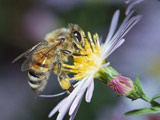As you may already know, Mountain View-based search engine giant Google does not mow the lawn with, well, a lawn mower. At its headquarters, Google employs goats (some 200 of them) to mow the lawn. By using goats Google, a company that has on several occasions affirmed its commitment to going green, employs a low-carbon approach to clearing the weeds and brush on the fields at its HQ.
In May 2009 and then again in April 2010, more than 200 goats from California Grazing were brought to clear the fields at Google’s Mountain View headquarters. The fields need clearing because if left as they are, they pose a fire hazard. Bringing in the goats costs as much as hiring lawn mowers – the difference is that mowers run on gas and pollute the air. The goats do the same job without polluting the air – furthermore they do not make a lot of noise and they fertilize the ground.
But enough about goats – let’s move on. Nature loving Google installed 4 beehives at its headquarters this spring. Known as the Hiveplex, each beehive is painted in one of Google’s colors. The hives are placed on Google’s campus, near large areas of wild flowers, but far away enough so that they don’t bother people.
The bees, announced Google, proved to be a big hit among its employees. More than 80 employees signed up to care for the bees.
At Google the bees have prospered. All summer long they were quite busy making honey, what else? When all the Google employees mentioned above went to collect the harvest, they were surprised to harvest about 405lbs (or about 183kgs). They left the bees enough honey so they can make it through the winter months.
“The honey is being put to good use—everyone who participated in the extraction got a jar to take home, while the rest of the honey will be used in the cafes and for cooking classes organized by Marc Rasic, an executive chef at Google and one of the people behind the beekeeping initiative,” explained Rob Peterson, Manager, Software Engineering.
I am happy to find out Google’s bees are doing well and they are not affected by Colony Collapse Disorder. Rob Peterson said the Google team is also happy that “none of the hives have succumbed to Colony Collapse Disorder.” The manager explained that the team will “be keeping a close eye on them over the winter months to ensure that they stay happy, healthy and ready to start work again in the spring.”
In May 2009 and then again in April 2010, more than 200 goats from California Grazing were brought to clear the fields at Google’s Mountain View headquarters. The fields need clearing because if left as they are, they pose a fire hazard. Bringing in the goats costs as much as hiring lawn mowers – the difference is that mowers run on gas and pollute the air. The goats do the same job without polluting the air – furthermore they do not make a lot of noise and they fertilize the ground.
But enough about goats – let’s move on. Nature loving Google installed 4 beehives at its headquarters this spring. Known as the Hiveplex, each beehive is painted in one of Google’s colors. The hives are placed on Google’s campus, near large areas of wild flowers, but far away enough so that they don’t bother people.
The bees, announced Google, proved to be a big hit among its employees. More than 80 employees signed up to care for the bees.
At Google the bees have prospered. All summer long they were quite busy making honey, what else? When all the Google employees mentioned above went to collect the harvest, they were surprised to harvest about 405lbs (or about 183kgs). They left the bees enough honey so they can make it through the winter months.
“The honey is being put to good use—everyone who participated in the extraction got a jar to take home, while the rest of the honey will be used in the cafes and for cooking classes organized by Marc Rasic, an executive chef at Google and one of the people behind the beekeeping initiative,” explained Rob Peterson, Manager, Software Engineering.
I am happy to find out Google’s bees are doing well and they are not affected by Colony Collapse Disorder. Rob Peterson said the Google team is also happy that “none of the hives have succumbed to Colony Collapse Disorder.” The manager explained that the team will “be keeping a close eye on them over the winter months to ensure that they stay happy, healthy and ready to start work again in the spring.”

























